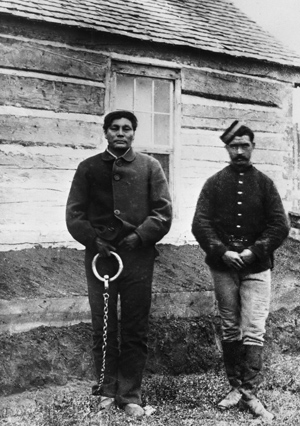 Mythology is a rich source for many information regarding the views people in earlier times, and each culture have their own myths about creatures our ancestors have either feared or revered. These beings range from the well-known gods and goddesses, to the feared monsters that are the source of horror, chaos, and destruction. In the Native American mythology, there is a certain monster that is described as powerful, and is highly feared by the Algonquins: this is the Wendigo.
Mythology is a rich source for many information regarding the views people in earlier times, and each culture have their own myths about creatures our ancestors have either feared or revered. These beings range from the well-known gods and goddesses, to the feared monsters that are the source of horror, chaos, and destruction. In the Native American mythology, there is a certain monster that is described as powerful, and is highly feared by the Algonquins: this is the Wendigo.A Wendigo (there are alternative spellings, though this one is something I prefer) is a fearsome creature that feeds on human flesh; it is malevolent, with great spiritual power, and is associated with Winter, as well as famine and starvation. According to the myth, a Wendigo was once a human who have resorted to cannibalism; once they've consumed flesh, an evil spirit will possess them, and forced the person to have an insatiable taste for human flesh. As with most cultures, cannibalism in the Algonquin culture is considered to be a taboo, even if it is a desperate act to save one's life.
I, myself, am a fan of horror and gore -- I grew to love it when I was still young and dreaming of being involved in the medical field; I thought it'll help me get used to the blood and all-- It's no question that I've come across several things which involves cannibalism. At a rather young age, I came across one of these, and to say I was horrified wouldn't cut it. I couldn't believe it actually happens in real life; it was one of the worst fears I had back then. But now I think I grew rather indifferent towards after learning how to view things in a more detached manner, as I do to most things people would normally think of as disgusting and horrific. So when I've come across the words "wendigo psychosis", I had the faintest feeling it was what I thought it is.
Wendigo psychosis is a culture-bound syndrome wherein the person inflicted has --as with the legend-- an insatiable craving for human flesh despite the fact that the person in question is not in a sort of famine. It's not only characterized by the cannibalism; according to an article by Chris Hibbard, there are other factors that makes a certain mental illness be categorized as Wendigo psychosis.
"The initial symptoms (thought to be psychosomatic) of the Windigo Psychosis were depression, distaste for most ordinary foods and a subsequent poor appetite, nausea, and vomiting, followed by periods of semi-stupor. Gradually, the victim becomes obsessed with paranoid ideas of being bewitched and is subject to homicidal and sometimes suicidal thoughts. He feels that he has been possessed by the Windigo spirit or monster and it is controlling him, it is this delusion that gives the psychosis its name."
One famous case of Wendigo psychosis is Swift Runner, who killed his wife and five children despite living 25 miles away from the nearest resource center. He admitted this without much prodding, and explained that the spirit of a Wendigo beckoned him to do it. He was arrested, and remained rather calm throughout his execution. He even thanked the people who arrested him. Strange, isn't it?
After years of reading and being desensitized to most horrors people would be screaming at, I think the most horrific thing that I've realized is how some people commit acts of brutality with no repentance, nor feeling. It is common today, I know that, but it wasn't because of apathy that makes is terrifying. It's that most people aware of what they're doing, how they know they are maddened by paranoia and other factors, and how it drives them to do unspeakable acts. But they can't do anything about it, to the point that they beg other people to make them stop, or they lost all feelings, if at all.

No comments:
Post a Comment